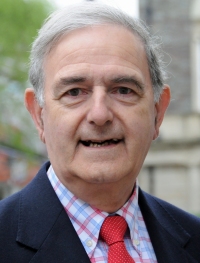
The first ever National Eisteddfod lecture to be organised by the Plaid Cymru History Society focused on the life of Gwynfor Evans and took place on 6 August 2012. It was delivered by Peter Hughes Griffiths, Plaid Cymru’s council group leader on Carmarthenshire County Council who served Gwynfor and Plaid Cymru as full-time organiser in the county. An extended version was given in Carmarthen on Friday 5 October as the Enid Jones memorial lecture. The Society is grateful to Peter for permission to reproduce the lecture on our website and to Councillor Alun Lenny for his kind help in supplying the photographs. This text has been translated from Welsh by Dafydd Williams.
GWYNFOR EVANS – THE LEADER AND THE MAN
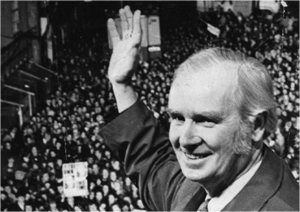 Gwynfor Richard Evans was born on 1 September 1912 – one hundred years ago – in Y Goedwig, Somerset Road, Barry in the Vale of Glamorgan, the son of Dan and Catherine Evans and brother of Alcwyn and Ceridwen. After studying his life, reading extensively about him and getting to know him personally – the only conclusion we and future historians I am sure can draw is this: How could one human being achieve so much during his life – politically, yes – but also in so many other fields – and all of this for the sake of Wales. Gwynfor Evans was special, and a person completely dedicated to his country, as far as I know, uniquely in our nation’s recent history. There is that one estimate he travelled over a million and a quarter miles during his life – for the sake of Wales. And according to Graham Jones of the National Library – “Gwynfor’s collection is the biggest collection the Library possesses, and it is still far from complete.” In his biography of Gwynfor, the author Rhys Evans records that in 1989 he published his millionth word in his eleventh book. He went on to publish a number of books after that, all this quite apart from the hundreds and hundreds of articles he wrote in Welsh and English for the Plaid newspapers, Y Ddraig Goch and the Welsh Nation, as well as the endless weekly statements, leaflets and pamphlets – all of them in the age of the typewriter – where he acknowledges that his wife Rhiannon would do all the hard work for him. This was the era of the power of the printed word, a time when people read extensively, before the arrival of radio and television. Dr Pennar Davies said that his name is an integral part of the reawakening of Wales in the twentieth century, while to quote his biographer Rhys Evans once more – “It was Gwynfor who created the ‘national movement… Gwynfor was also the founder of the Parliament for Wales campaign … There is now a lasting memorial to that organisation in Cardiff Bay – It is the Assembly, the unmistakable symbol, for better or worse, of the desire of the people of Wale to live as a democratic nation.”
Gwynfor Richard Evans was born on 1 September 1912 – one hundred years ago – in Y Goedwig, Somerset Road, Barry in the Vale of Glamorgan, the son of Dan and Catherine Evans and brother of Alcwyn and Ceridwen. After studying his life, reading extensively about him and getting to know him personally – the only conclusion we and future historians I am sure can draw is this: How could one human being achieve so much during his life – politically, yes – but also in so many other fields – and all of this for the sake of Wales. Gwynfor Evans was special, and a person completely dedicated to his country, as far as I know, uniquely in our nation’s recent history. There is that one estimate he travelled over a million and a quarter miles during his life – for the sake of Wales. And according to Graham Jones of the National Library – “Gwynfor’s collection is the biggest collection the Library possesses, and it is still far from complete.” In his biography of Gwynfor, the author Rhys Evans records that in 1989 he published his millionth word in his eleventh book. He went on to publish a number of books after that, all this quite apart from the hundreds and hundreds of articles he wrote in Welsh and English for the Plaid newspapers, Y Ddraig Goch and the Welsh Nation, as well as the endless weekly statements, leaflets and pamphlets – all of them in the age of the typewriter – where he acknowledges that his wife Rhiannon would do all the hard work for him. This was the era of the power of the printed word, a time when people read extensively, before the arrival of radio and television. Dr Pennar Davies said that his name is an integral part of the reawakening of Wales in the twentieth century, while to quote his biographer Rhys Evans once more – “It was Gwynfor who created the ‘national movement… Gwynfor was also the founder of the Parliament for Wales campaign … There is now a lasting memorial to that organisation in Cardiff Bay – It is the Assembly, the unmistakable symbol, for better or worse, of the desire of the people of Wale to live as a democratic nation.”
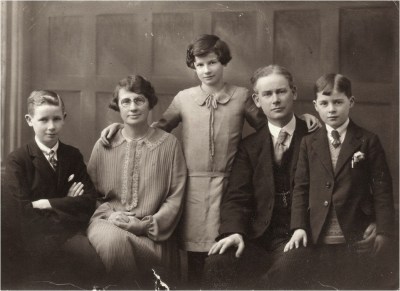
The opening sentence of the Welsh Academy’s Encyclopaedia of Wales describes him in this way: “The greatest patriot of 20th-century Wales, his dedication to his country did much to transform the national prospects of the Welsh people”. He received the Fellowship of a number of our colleges as well as serving as President of the Day in the National Eisteddfod more often than any other person in our time. Capel y Tabernacl in Barry was spiritual home for the entire family, with Gwynfor’s mother and father playing leading roles and his grandfather the Reverend Ben Evans its first minister. His father was a deacon and conductor of the mixed choir of over a hundred voices that performed the major oratorios on a regular basis. In the year 2,000 a new stained glass window was unveiled to honour the lives of Dan and Catherine, who set up well known, flourishing businesses in Barry town. Gwynfor attended Barry Grammar School where he captained the school’s cricket and hockey teams, and was selected to play in the Welsh Schools Cricket Team in 1930. Then it was off to University College, Aberystwyth and a law degree – and selection to play in the college cricket and hockey teams once more.
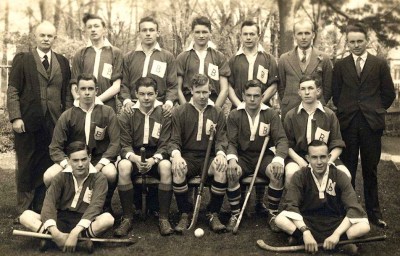
While in University, there took place two events that would have a strong influence on his later life – the first: “I would marvel at the dedication of the young men and women who sold Y Ddraig Goch on the streets of Aberystwyth – Gwenant Davies, Eic Davies and others.” And secondly – “but one day he saw a yellow coloured pamphlet outside a bookshop in Aberystwyth – The Economics of Welsh Self Government by DJ Davies. This booklet removed all kinds of doubt, and in the summer of 1934 he approached Cassie Davies in Barry and joined the national party.” At the time Cassie Davies was a member of staff at Barry College and in her book Hwb i’r Galon she recalls – “And this was the time that a remarkably good-looking young man from Barry, wearing an Aberystwyth college blazer, began to call to talk about this new party and ask to join it.” Gwynfor then went to Oxford University where he set up a party branch and became secretary of the famous Cymdeithas Dafydd ap Gwilym. He graduated there in 1936. Although he was to send an article from Oxford for his old school’s magazine, parts of which appeared in the Western Mail, it was in January 1937 that he published his first full article in Y Ddraig Goch, dealing with the establishment of the St Athan camp, and in the Plaid Cymru Summer School in Bala the same year he proposed a motion calling for official status for the Welsh language. And guess what – 400,000 signatures were collected in support of the proposal before the Second World War put paid to that effort. So you can see that Gwynfor had already made his first major strides in what was to be his life’s work – for the sake of Wales. He became a member of Plaid Cymru’s national executive in 1937 and within six years, in 1943, he was chosen as party vice-president. Then on 1 August 1945 in the Llangollen conference (five days before the bomb was dropped on Hiroshima) he was elected as President of Plaid Cymru at the age of just 32, the start of his great lifetime mission – he would remain president and leader for the next 36 years.
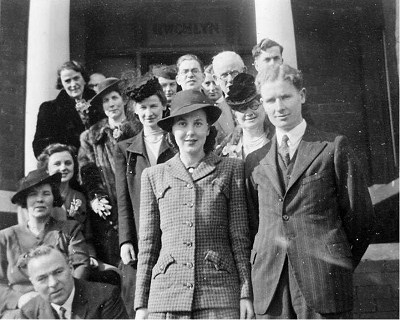
In the meantime he had married his lifelong partner Rhiannon and was living in Wernellyn, Llangadog where he launched a market garden venture. I like his description of how he fell for Rhiannon. In his autobiography Bywyd Cymro, available in English as For the Sake of Wales, Gwynfor describes how he called on Rhiannon’s parents in Cardiff – “I have to confess that my heart lost a beat the moment Rhiannon walked into the room. On seeing her again two months later amid the beauty of a summer’s day at Islaw’r Dref dressed in a very short light frock – beach wear no doubt – the boy from Barry fell head over heels in love!” They were married on St David’s Day 1941, and Pennar Davies says in his book that if heaven had ever arranged marriages this was surely one it had done well: “And the contribution of Rhiannon Evans to the work of her husband cannot be overestimated.” Gwynfor contested his first Parliamentary election in Meirionydd in 1945. He led the Llyn y Fan protest on New Year’s Day 1947 and that in Abergeirw in 1948 and was elected a member of the University Court’s Guild of Graduates and of the Welsh Independents the same year, as well as serving as Welsh Secretary of the Celtic League in the Colwyn Bay National Eisteddfod as early as 1947, when he was 34. It is evident that by the end of the 1940s Gwynfor Evans had established himself as a national leader with wide support among his people.
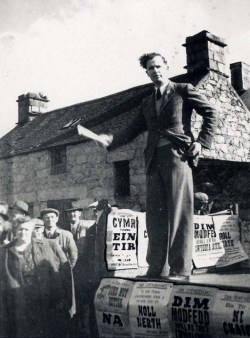
Gwynfor was elected to Carmarthenshire County Council in 1949 and was a County Councillor for 25 years. The 1956 County Council elections produced an interesting result, with 29 Independent councillors, 29 Labour and 2 Plaid Cymru. Plaid Cymru held the balance, and stranger still both Plaid councillors bore the name Gwynfor Evans – Gwynfor Evans of Betws, Ammanford and Gwynfor Evans, Llangadog. Gwynfor Evans, Betws took the county council to the High Court in London for failing to provide nomination papers in Welsh – and won his case, leading significantly to the establishment of the Hughes Parry Committee in 1963 to investigate the legal status of the Welsh language. In 1949 Gwynfor led Plaid Cymru’s most ambitious Rally ever – 4,000 people came to Machynlleth to call for a Parliament for Wales, and after Gwynfor’s speech one correspondent concluded that the accolade of Wales’ leading orator should be awarded to Gwynfor rather than Aneurin Bevan. There followed further Parliament for Wales rallies in Blaenau Ffestiniog in 1950 and then the great rally in Cardiff in 1953, with a quarter of a million people signing a petition presented to the House of Commons. Gwynfor fought Meirionydd in the 1950 General Election, the Aberdare by-election in 1954 and Meirionnydd again in 1955 and 1959. And what about the fight for Tryweryn? A rally in Bala in 1956 – “No sooner had Mr Gwynfor Evans got to his feet to speak than the thousands in the great marquee stood up to welcome him and give him prolonged applause.” And in his book Bywyd Cymro Gwynfor said– “And except for the Parliament for Wales campaign, Tryweryn was the most important of all our campaigns.” Gwynfor’s leadership during that battle have been recorded in detail and the deputations to Liverpool and so on are historical events. Gwynfor wrote – “The Welsh had been as united as ever any nation could be. Their opinion was completely ignored. The state of democracy in Wales was exposed.”
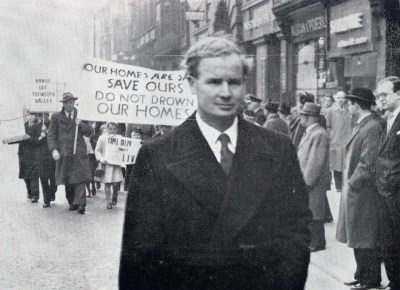
A young woman – Jennie Eirian Davies, married to a minister in Brynaman – stood as Plaid Cymru’s first candidate in Carmarthen in the General Election of 1955 and again in a by-election in 1957. Dewi Thomas writes about her in a book of tribute to her – “Her tireless dedication and brilliant talent in the fifties opened the door for Gwynfor’s success in the great victory in Carmarthen later on.” Indeed Jennie Eirian herself said after the 1957 election – “The Blaid will win this seat within 10 years.” That happened in 1966 – within 9 years! Where should I begin with Gwynfor’s victory in the 1966 by-election? That story deserves a lecture in its own right. You will get that in 2016 when we celebrate the 50th anniversary of the victory! All I wish to say tonight is that the fact that result took place changes the political history of Wales for ever. Gwasg y Dryw brought out a record of Gwynfor speaking after his victory, calling on his country to will a full life and the means of creating it, a Welsh government. Today that government exists. We are on the way to securing a comprehensive Welsh government, Gwynfor’s full vision. Think about him going to London and the House of Commons and entering the lion’s den – “As he showed me round the tea rooms, Emrys Hughes pointed to the Welsh table, saying, ‘I wouldn’t sit there if I were you ’– ‘Your name is mud there.’ Goronwy Roberts used to pass me in the corridor without looking at me. It may be difficult for some readers to recall how vicious George Thomas could be. He was extremely set in his anti-Welsh sentiment. He was the very scourge of Welsh nationalism and the Welsh language.”
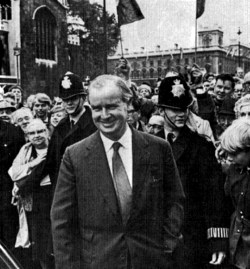
That was the environment Gwynfor entered, but he took advantage of that imperial establishment to fight for Wales and call for self-government. Things like this – With the support of Plaid Cymru’s Research Group, he came to the conclusion that the best tactic was to wage a guerrilla war and ask numberless questions about the situation of Wales. Gwynfor’s question would drive the civil service crazy: by the end of the first year he had asked over 600 questions, all of them published together with their answers in three volumes –the Black Books of Carmarthen. Then the party set out Plaid Cymru’s case to the Royal Commission on the Commission in 1969. Losing Carmarthen in 1970 – after the Investiture, direct action by Cymdeithas yr Iaith and the FWA (if such a thing existed!). Then losing by just 3 votes in March 1974 and scoring a sweeping victory in October 1974. At half past three in the morning a crowd of 3,000 were on Nott Square to hear the result and that Gwynfor had taken 23,325 votes. This was the only seat that Labour lost anywhere in the United Kingdom that night. So back to London, but this time with the two Dafydds for company! His working day would often commence at nine o’clock in the morning and carry on into the early hours of the following morning. This was a crucial period for making the case for assemblies for Wales and Scotland – there were three nationalist MPs from Wales as well as seven from Scotland. The Government’s majority over the other parties was only three. Gwynfor said – “Here was the most hopeful political situation I had ever encountered”. The Government was compelled to yield to the pressure for parliaments for Wales and Scotland – and this marked the beginning of a long and difficult journey which has now taken place, much more so in Scotland than in Wales! The Labour Party took care to ensure that the devolution referendum in Wales and Scotland faced barriers so that it was impossible for the Yes vote to succeed. We remember Neil Kinnock and others in the Labour Party campaigning strongly against their party’s own policy and getting every facility to do so. The outcome was the Na vote in the 1979 Assembly referendum in Wales. Rhys Evans says – “Gwynfor experienced many highs and lows in his career, but this was the nadir. For him and his generation of nationalists, the referendum was more than a ballot on the administration of Wales; the referendum was a vote on the spiritual and existential question of whether Wales existed. He was devastated, not knowing which made him feel more sick … Welsh toadyism or Labour deceit and corruption.”
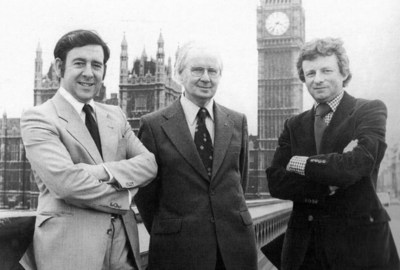
He lost the General Election that followed the Referendum because of publication of a BBC opinion poll days before the election that predicted that Gwynfor would come a poor third. In my personal opinion all this had been arranged by the ‘establishment’ to get rid of Gwynfor from the House of Commons. In fact, the BBC admitted following a detailed review of the company that carried out the opinion poll that were unacceptably far from the mark! Gwynfor’s response was – if he had won that election, with his health as it was at the time, he would no longer be in the land of the living! And then in 1981 after 36 years as President of Plaid Cymru Gwynfor stepped down from the helm in the Conference in Carmarthen. That is a quick sketch of the work and impact of Gwynfor in the field of politics. It was a very profound impact, and we would never be where we are today but for Gwynfor having accomplished so much. His political success is now acknowledged by everyone. A very very special man. But what is truly remarkable about this man is that he accomplished so much side by side with his political career. And what I want to do now is give you a taste of those accomplishments, and remind you of the other tremendous pioneering roles he played. And where should I begin?
THE HISTORIAN
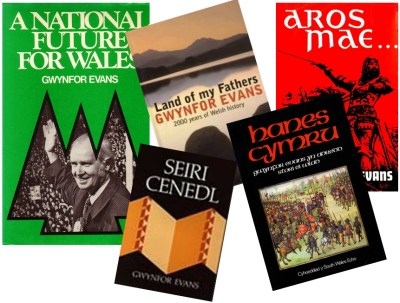
A few of Gwynfor’s many books
Gwynfor would almost invariably begin every speech with a history lesson. It didn’t matter where, or what was the occasion, the history of Wales was part of the message. He believed it was very important that we as a people should get to know our history. He campaigned to teach Welsh history in our schools – at a time when that was virtually non-existent, and he set about writing and publishing books, and encouraging others to do the same – “Gwynfor’s aim throughout his life was to awaken national consciousness through imbuing people with the history of Wales, restoring their memory and strengthening their desire to live.” (Dr Geraint Jenkins) He wrote history classics –Hanes Cymru/ History of Wales, through the South Wales Echo. Then Aros Mae, Seiri Cenedl y Cymry and Land of My Fathers. Picture him setting out on Christmas Day 1970 to write the first two pages of notes for Aros Mae! It was on sale within 7 months, with the first edition selling fast and a second edition soon in hand. Elin Garlick set about a translation into English, entitled Land of My Fathers. Three reprints were to follow and the publishers Tŷ John Penry commented– “this was the best seller of all the books we have published.” His other historical classic is Seiri Cenedl y Cymry, available in English as Welsh Nation Builders, portraits of the history of 65 men and women who contributed in different ways to the building and development of our nation. Think of all the research work needed to write historical studies and get the facts right! Gwynfor was a prolific author – of some 30 books in total – as well as pamphlets, leaflets and numerous books, in Welsh and English. He told me once of his intention to write one more book based on all his travelling around Wales – a study of Welsh chip shops as he had eaten in so many of them as he criss-crossed the country!
THE CHRISTIAN AND PACIFIST
We heard the Reverend Beti Wyn James and Mererid Hopwood assessing the significance of Gwynfor’s contribution in these two fields in the memorial service held in Capel y Priordy on Sunday 2 September. So I shall just summarise some of the main features. Gwynfor was a teacher in the young people’s Sunday School in his chapel, Providence Llangadog, for many years, and what is special id this – wherever he had been on the Saturday night – he would almost always return for his Sunday School class the following day. Read the full chapter about Gwynfor the Pacifist in the book by Pennar Davies – it gives us a comprehensive and detailed picture of the depth of his thinking and his faith.
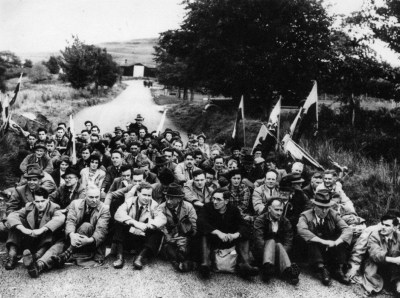
Defending the land of Wales – successfully – Trawsfynnydd, 1951
He was brought up in a Christian family in Barry where his grandfather The Reverend Ben Evans was the first Minister of Capel y Tabernacl. His uncle Idris (his father’s brother) was also a minister and a first-class preacher. Gwynfor became Chairman of the Union of Welsh Independent Churches when he was just forty-two years of age. No-one as young as that had ever been elected before. And his son Guto was also President of the Union in recent times. It is important to recall that in his maiden speech in the House of Commons Gwynfor based his hopes for Wales on the Christian values of its heritage. He occupied a number of positions in the Independents’ organisation and he also played a key role in setting up Tŷ John Penry and its administration. His Christianity was always practical. “I am first a pacifist and then a nationalist” were Gwynfor’s words when given an unconditional discharge after appearing before a military Tribunal in Carmarthen in 1940. After writing his first article about St Athan in 1937 he came under the influence of his great hero George M LL Davies, becoming Secretary of Heddychwyr Cymru, the Welsh peace pledge movement and responsible for its tent in the Cardiff National Eisteddfod in 1938. Throughout his life he led protests and spoke in peace rallies – Swansea Rally in 1940, the great rally to defend Epynt where 400 people were turned out of their homes, the Abergeirw rally of 1948 and Trawsfynydd in 1951, with its celebrated photograph – all of these against the War Office grabbing Welsh land. The Peace Pledge Union was indebted to him for his support and leadership and Gwynfor published a number of booklets and pamphlets such as They Cry Wolf and Wales Against Conscription. Then, in 1973, he delivered his famous lecture in the Temple of Peace, Cardiff – Non-violent Nationalism. He was just as supportive of CND as well, and spoke most strongly time and time against the Vietnam War, offering himself as a human shield in Hanoi in 1968 – but his group were refused admission – nevertheless the act as typical of a man who could not stand by and watch such slaughter. Dafydd Elis Thomas says of him in one of the Peace Pledge Union’s newsletters: “This great soul was born in the most violent century in the history of the world. In the darkness of the warlike twentieth century his life was a beacon.”
FIGHTING FOR THE LANGUAGE
Gwynfor played a vital role in the campaign to secure a radio service for Wales – in 1939 the BBC removed programmes about Wales completely. In the National Eisteddfod in Llandybie in 1944 Gwynfor gave a lecture to a packed chapel on Radio In Wales. The lecture was published in Welsh and in English and 10,000 copies were sold! Gwynfor argued for devolution in the field of broadcasting, and to cut another long story short – this was successful and he was elected as a member of the BBC’s Welsh Advisory Committee in 1946. Although it would be a long battle, BBC Wales together with Radio Cymru and Radio Wales were secured later on.
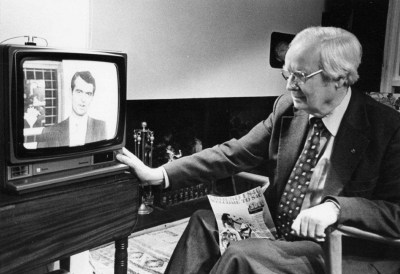
Victory – the first day of the Welsh language television service on S4C, 1982
By the mid 1950s Gwynfor could also see that the arrival of television also meant a revolutionary change in the system of communications that posed a major threat to the Welsh language and culture. He pressed the idea of Welsh television, but the government did nothing to help, and he did not succeed in fulfilling his aim. Gwynfor made an important Commons speech in 1969, calling specifically on the government to establish a Welsh Channel, and you know about that campaign in the 1970s. The story of the campaign to ensure the setting up of S4C is one that will always be associated with Gwynfor and his intention to fast after the Tory Government broke its pledge – that story would be another lecture as later this month we mark the 30th anniversary of broadcasting on C. Apart from the non-stop leadership Gwynfor provided for every aspect of the language struggle, there was his campaign for a Welsh language College. He became a member of the University Court and in 1951 he proposed setting up a Welsh College, with a committee set up to consider the idea. Everyone was opposed apart from Gwynfor, who again in 1953 prepared a detailed memorandum showing the need for this type of college. He carried on the struggle in following years – another campaign in 1973 and then in 1986 when addressing the first Welsh language graduation ceremony organised by the Welsh Students Union in Aberystwyth. He showed great determination and unswerving drive – and by now the Welsh College exists, with its administrative centre in Y Llwyfan here in Carmarthen. THE FAMILY MAN “He would never tell us or our children – ‘go away, I’m too busy, and he never waved a finger at us to chastise us. His patience with the children was limitless.” Those are the words of his daughter Meinir. The family moved from Wernellyn to Talar Wen in 1953 – “Talar Wen was my father’s wedding present, postponed for fifteen years” said Gwynfor. “Everything used to build the house was from Wales and Rhiannon’s brother Dewi Prys designed it.”
 Gwynfor and his family
Gwynfor and his familyThey had seven children and in response to a journalist Gwynfor said that his favourite Biblical saying was – “Be fruitful and multiply and fill … the earth”. He loved playing with the children – and dressing up as Auntie Jini, fooling the grandchildren into believing she was a half sister from America. He also loved walking with the children, and his favourite place was y Garn Goch – the mountain where his ash was scattered and where a memorial stone stands at the foot of the hillside. Like his father, Gwynfor was musical and liked to play the piano. According to his brother Alcwyn, Gwynfor would tend to go to the piano when he faced pressure, and when playing he would be able to relax. Gwynfor and Rhiannon moved to another Talar Wen in Pencarreg near Llanybydder in the summer of 1984 when he retired. A big farewell supper was held in Llangadog hall for the community to pay tribute to a couple who did so much for the Welsh traditions of the area for a period of 45 years. When 17 Plaid Cymru members were elected to the first National Assembly in 1999 they all came to Pencarreg to see Gwynfor and Rhiannon. Other visitors included Winnie Ewing with Rhodri, Cynog and Roy Llywelyn. On the day before Gwynfor celebrated his 90th birthday a piece about him was carried in the Western Mail. He headline read – ‘Pacifist giant of Welsh culture whose place in history is secured – Wales celebrates 90 years of Gwynfor’. “Gwynfor Evans has been described as ‘one of the greatest souls of the 20th century. Alongside Lloyd George and Aneurin Bevan he is one of the last century’s three greatest Welsh politicians. But he arguably stands alone and ahead of them all in the measure of his influence and is one of the few people from any era recognised solely by their Christian name. “Gwynfor’s place in history is secure, and not just through his achievements and influence but his public acclaim. He was chosen by readers of Wales on Sunday as Millennium Icon ahead of Lloyd George and Aneurin Bevan, voted Welsh Person of the Millennium ahead of Owain Glyndŵr by readers of Y Cymro and was reader’s choice in the Western Mail’s Person of the Millennium Award. They were popular endorsements of the greatest living Welshman of the 20th century.” Gwynfor appeared in public for the last time at the 2,000 National Eisteddfod in Llanelli, where he received the Worldwide Welsh Award for a lifetime’s work for Wales. The ceremony was full of emotion, with a packed pavilion honouring this very special man. And to conclude, I would like to quote Professor Geraint Jenkins in his address to the Gymanfa Ganu we held in Capel Heol Awst to mark Gwynfor’s life soon after he died. This is what he said – “Set about praising and publicly honouring Gwynfor’s name by erecting a fitting monument to him. What better place could there be to place a fitting memorial than here in Carmarthen, where he experience his big moment on 14 July 1966 so that your children and your children’s children can come here to admire one of the great figures of our nation.” And as you know that work is now in hand, with the intention of realising a monument by 2,016, the fiftieth anniversary of his great victory in 1966. Gwynfor Richard Evans died on Thursday morning 21 April 2005 at the age of 92 in his home in Talar Wen, Pencarreg. Rhys Evans says: “Gwynfor wanted to return to Garn Goch, to the soil, the land of Wales where his politics had taken root. Nevertheless, as his ashes blow in the wind, his legacy survives.” And Dr Geraint Jenkins says: “His aim was to build a nation that was free, responsible and confident, by restoring the memory of its people and strengthening its will to live – and we should remember him as ‘Llusernwr y canrifoedd coll’, the illuminator of the lost centuries. Time after time Gwynfor was there to stand in the breach – his life reflected the history of Wales 1940 on. The foundation of Gwynfor’s life was his Christianity and his pacifism.” The last sentences in Rhys Evans’ substantial volume are: “No one did more than Gwynfor in the twentieth century. It is not the Welsh-speaking Christian Wales that Gwynfor dreamed of, but it is still Wales. Wales, the nation he loved with such passion, has survived, despite it all.”
Peter Hughes Griffiths
